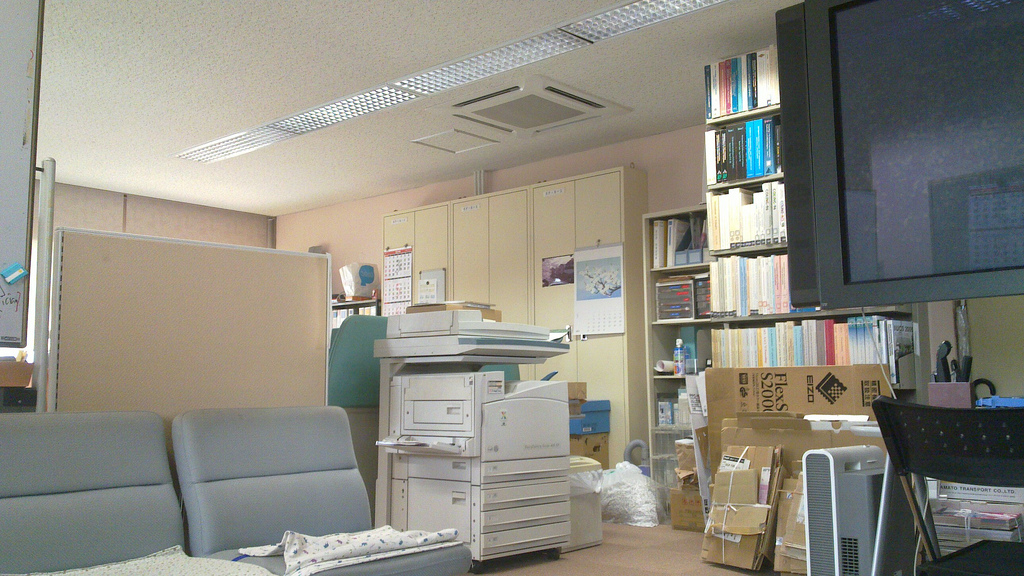Help us protect the commons. Make a tax deductible gift to fund our work. Donate today!

Photo copier by David Hall, CC BY 2.0
Creative Commons (CC) has asked a U.S. appeals court for permission to file an amicus brief in a lawsuit brought by Great Minds against Office Depot, to aid the court in its proper interpretation of the CC BY-NC-SA 4.0 license.
This case involves a dispute between Great Minds, the creator of educational materials paid for with public funding and licensed under a CC BY-NC-SA 4.0 license, and Office Depot, a commercial copyshop hired to make copies of those materials by public school districts. Great Minds claims here, and in an almost identical lawsuit brought against FedEx Office, that the schools cannot hire outside help to make the copies they need to use the materials for their non commercial purposes in the classroom. Notably, Great Minds explicitly did not object to the idea of a school board employee going to an Office Depot and using a self-serve copier (where copies are sold to customers at a profit). It was only when they engaged an Office Depot employee to make the copies that Great Minds objected.
In the litigation against Office Depot, the district court in California ruled in favor of Office Depot, just as the New York district court and the 2nd Circuit Court of Appeals ruled in FedEx Office’s favor. The California court agreed that so long as a copyshop is acting at the request of a non commercial actor, here the school district, the shop can make the copies and charge for and receive a profit to do so, without violating the license. This is because the copyshop is not acting on its own accord but as a delegate of school district, just as a paid employee of the school might when making copies for use in her classroom.
The brief we request be accepted reinforces what is already the established legal precedent established by the FedEx Office case in the 2nd Circuit Court of Appeals in the United States (spanning New York, Connecticut, and Vermont), as well as the law in the district court in California that Great Minds is now appealing.
CC supports the decision of the California court, which found Great Minds’ lawsuit was an attempt to re-argue the same facts in a different court – a previous lawsuit it had filed, appealed, and lost in the 2nd Circuit against FedEx Office. (See the court order requiring Great Minds to pay Office Depot’s attorney fees for having done so). As both the 2nd Circuit concluded in a case involving FedEx Office [pdf] and the district court concluded in California [pdf], a bona fide non-commercial user may engage contractors to exercise the licensed rights on their behalf and at their direction, irrespective of whether the contractor is itself a non-commercial actor. Notably, in the course of all of its litigation, Great Minds has never objected to the idea of a school board employee going to an Office Depot and using a self-serve copier (where copies are sold to customers at a profit). Its concern has been limited to the nearly identical circumstance a school district employee paying an Office Depot employee to make the copies instead. Were Great Minds’ theory to prevail, it would require every re-user to own the means for reproducing NC-licensed works and avoid using any for-profit actor in doing so, a result that our licenses never intended.
This is not a change from how our licenses have always worked. This does not mean, for example, that a commercial copyshop can independently make copies of NC-licensed textbooks and turn around and sell them. Nor does it mean a teacher can sell an NC-licensed textbook to her neighbor that she previously received from her school district to use in the classroom. In those cases, both the copyshop and the teacher are bound by the NC restriction because they are acting on their own and thus are licensees, in their own right, and the NC restriction would almost certainly be violated.
The filing and acceptance of amicus briefs is standard practice in U.S. appellate courts. Unfortunately, Great Minds has opposed our request on grounds that CC’s interpretation of the very licenses that we wrote and steward will not be of assistance to the Court. Filing such an opposition is rare, and CC has filed a short reply in response.
The outcomes of this case against Office Depot and the prior case against FedEx Office demonstrate the strength of the CC licenses, and we look forward to a successful conclusion in the 9th Circuit.
Finally, we want to thank Andy Gass and his team of lawyers at Latham & Watkins for their expertise and valuable insights in connection with both lawsuits.
Posted 02 October 2018